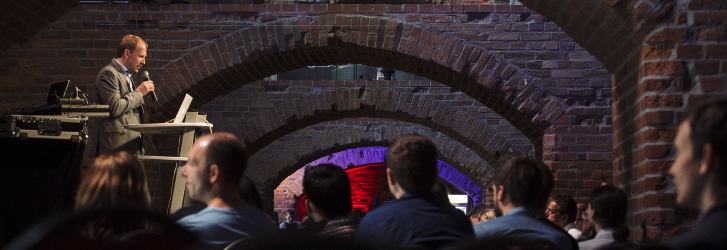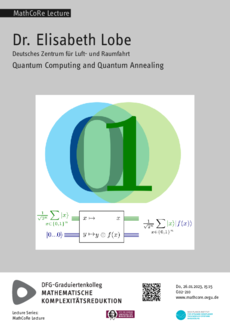
Dr.Elisabeth Lobe, Deutsches Zentrum für Luft- und Raumfahrt e.V. (DLR), will give a talk on "Quantum Computing and Quantum Annealing". It will take place on January, 26th at 15:15 in G02-210 and hybrid via Zoom. The slides for the lecture are available here.
Abstract
Due to the exploitation of quantum mechanical effects, quantum computers promise to yield a larger computational power than existing classical machines. In this talk, the basic terms and main principles of quantum computing are presented: Several quantum bits (in short qubits) form a quantum register, which can be combined with quantum gates to a quantum circuit. Such a computation can realize the superposition of different quantum states, allowing for the powerful quantum parallelism, the computation on different values at the same time. Through the entanglement of two or more qubits, manipulations applied to one qubit directly influence the others, too. However, to retrieve the information encoded in the quantum system, a measurement needs to be performed, which "destroys" the quantum system and returns classical information. Qubits in a superposition randomly collapse to one of the base states and the information about the other states is lost. Famous quantum algorithms, such as Deutsch-Josza, Grover and Shor, demonstrate the possibilities of this computational model. However, it is still under discussion whether there is a substantial advantage over classical computation. The currently available NISQ-devices (for noisy intermediate-scale quantum devices) not only realize just a few qubits but also introduce further difficulties, such as dealing with errors.
In the second part, we distinguish the universal gate-based model from the adiabatic quantum computation, where quantum systems are transformed into each other through adiabatic evolution. According to the adiabatic theorem, the ground state, the state with the lowest energy, can be preserved and thereby an optimization problem, encoded in the final quantum system, can be solved. Existing machines, such as those from D-Wave Systems, are imperfect realizations of this theoretical concept and serve as heuristic solvers for Ising problems. For those the term "quantum annealers" has established. To deal with several additional hardware restrictions, different transformation steps on the actual optimization problem need to be applied before it can be send to the machine. Although this technology already realizes over 5000 qubits, the thus introduced overhead limits their practical usability.
Lecture Series: MathCoRe

